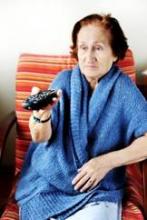Older women are sedentary for approximately two-thirds of their waking hours, usually in bouts lasting about 30 minutes each punctuated by brief periods of activity, according to a report published Dec. 18 in JAMA.
Recent studies suggest a high volume of sedentary behavior may be a risk factor for adverse health outcomes. However, few data exist on how this behavior is patterned (for example, does most sedentary behavior occur in a few long bouts or in many short bouts?)
In a research letter to the editor, investigators presented data collected from 7,247 older women (mean age, 71 years) participating in an ancillary study of the Women’s Health Study who wore accelerometers for 1 week to track their physical activity. Overall, the women spent 65.5% of their waking hours – the equivalent of 9.7 hours per day – in sedentary behavior, said Eric J. Shiroma of Harvard School of Public Health, Boston, and his associates.
The mean number of sedentary intervals was 85.9/day, with a mean of 9 breaks per sedentary hour. Most sedentary time occurred in short rather than long intervals, with approximately one-third of the sedentary bouts lasting roughly 30 minutes, the researchers said (JAMA 2013;310:2562-3).
Accelerometers cannot convey whether the women were sitting, standing, or lying down during sedentary periods, but it is most likely that they were sitting. "If future studies confirm the health hazards of sedentary behavior and guidelines are warranted, these data may be useful to inform recommendations on how to improve such behavior," Mr. Shiroma and his associates said.
They noted that most participants in the Women’s Health Study were white and of higher socioeconomic status, so these findings may not apply to women of other backgrounds.
This study was supported by the National Institutes of Health. No relevant financial conflicts of interest were reported.


